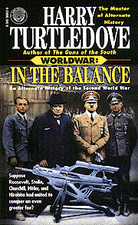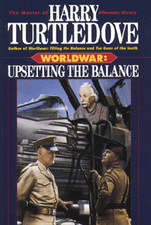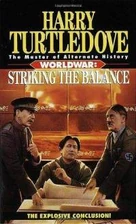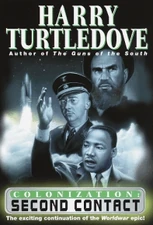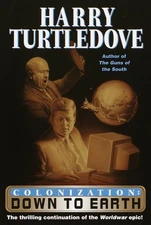No edit summary |
GusF (Message Wall | contribs) No edit summary |
||
| (13 intermediate revisions by 6 users not shown) | |||
| Line 1: | Line 1: | ||
| − | '''Emperor-worship''' |
+ | '''Emperor-worship''' was the religion of [[the Race]]. It was centered around reverence for the [[Spirits of Emperors Past]]. Its theology was simple: if citizens of the Empire (regardless of species) obey the reigning [[Emperor of the Race|Emperor's]] authority, the spirits of his ancestors will look after the spirits of the faithful adherents in the afterlife. It was the only religion practiced on [[Home]], [[Halless 1]], or [[Rabotev 2]]. Indeed, its role in Race society was such that no other word existed to describe religion. This made it linguistically difficult for members of the Race to describe the various religions of [[Tosev 3]] (Earth). |
| − | Emperor-worship received mixed reactions when [[Atvar]] attempted to introduce it to |
+ | Emperor-worship received mixed reactions when [[Fleetlord]] [[Atvar]] attempted to introduce it to Tosev 3. It was met with staunch opposition by [[Tosevites]] in some of the territories ruled by the Race, especially by adherents of Abrahamic religions. It was rejected not only by [[Islam (Worldwar)|Muslims]], who opposed the Race in general, but also by [[Catholicism (Worldwar)|Catholics]] and [[Jews (Worldwar)|Jews]], whose stance on Race rule tended to range from neutral to positive. In [[China (Worldwar)|China]] and [[India (Worldwar)|India]], on the other hand, where the natives rebelled against Race rule frequently, Emperor-worship was accepted by large segments of the population. However, the [[Chinese Communist Party (Worldwar)|Chinese Communists]] - not very enthusiastic even about human religion - regarded Emperor Worship as an act of collaboration with the occupiers, and punished severely those practicing it. |
| − | In 1965, Atvar asked leaders of the various independent [[not-empires]] to allow emperor-worship within their borders. |
+ | In 1965, Atvar asked leaders of the various independent [[not-empires]] to allow emperor-worship within their borders. It was forbidden by all the human governments except the [[United States of America (Worldwar)|United States]], which was obliged to give the Race permission to set up shrines in its territory under the Free Exercise Clause of its [[United States Constitution (Worldwar)|Constitution]]. By the early- to mid-twenty-first century, it had developed a significant following in the state of [[California (Worldwar)|California]] and the rest of the country, even exceeding some of the Race's territories in terms of numbers. This paradox confused several members of the Race though some accepted it as a sign of assimilation. The other governments staunchly forbade Atvar to set up shrines in their territory, citing suspicions of espionage and sabotage among other concerns. The [[Japan (Worldwar)|Japanese]] - who, of all humans, had the closest analogue in their own culture - firmly rejected the Race's religion, exactly because they had Divine Emperors of their own. |
| − | Emperor-worship |
+ | Emperor-worship was practiced by the [[Rabotevs]] and [[Hallessi]], who were full citizens of the Empire and who accepted it because it resembled similar belief systems in place in their cultures when their planets were conquered by the Race. It was also practiced by [[Kassquit]], the Empire's first Tosevite full citizen. |
| + | {{Worldwar}} |
||
| − | [[Category:World War|Emperor-worship]] |
||
[[Category:Religion|Emperor-worship]] |
[[Category:Religion|Emperor-worship]] |
||
| + | [[Category:Worldwar]] |
||
Revision as of 19:28, 19 December 2020
Emperor-worship was the religion of the Race. It was centered around reverence for the Spirits of Emperors Past. Its theology was simple: if citizens of the Empire (regardless of species) obey the reigning Emperor's authority, the spirits of his ancestors will look after the spirits of the faithful adherents in the afterlife. It was the only religion practiced on Home, Halless 1, or Rabotev 2. Indeed, its role in Race society was such that no other word existed to describe religion. This made it linguistically difficult for members of the Race to describe the various religions of Tosev 3 (Earth).
Emperor-worship received mixed reactions when Fleetlord Atvar attempted to introduce it to Tosev 3. It was met with staunch opposition by Tosevites in some of the territories ruled by the Race, especially by adherents of Abrahamic religions. It was rejected not only by Muslims, who opposed the Race in general, but also by Catholics and Jews, whose stance on Race rule tended to range from neutral to positive. In China and India, on the other hand, where the natives rebelled against Race rule frequently, Emperor-worship was accepted by large segments of the population. However, the Chinese Communists - not very enthusiastic even about human religion - regarded Emperor Worship as an act of collaboration with the occupiers, and punished severely those practicing it.
In 1965, Atvar asked leaders of the various independent not-empires to allow emperor-worship within their borders. It was forbidden by all the human governments except the United States, which was obliged to give the Race permission to set up shrines in its territory under the Free Exercise Clause of its Constitution. By the early- to mid-twenty-first century, it had developed a significant following in the state of California and the rest of the country, even exceeding some of the Race's territories in terms of numbers. This paradox confused several members of the Race though some accepted it as a sign of assimilation. The other governments staunchly forbade Atvar to set up shrines in their territory, citing suspicions of espionage and sabotage among other concerns. The Japanese - who, of all humans, had the closest analogue in their own culture - firmly rejected the Race's religion, exactly because they had Divine Emperors of their own.
Emperor-worship was practiced by the Rabotevs and Hallessi, who were full citizens of the Empire and who accepted it because it resembled similar belief systems in place in their cultures when their planets were conquered by the Race. It was also practiced by Kassquit, the Empire's first Tosevite full citizen.
| |||||||||||||||||||||||||
